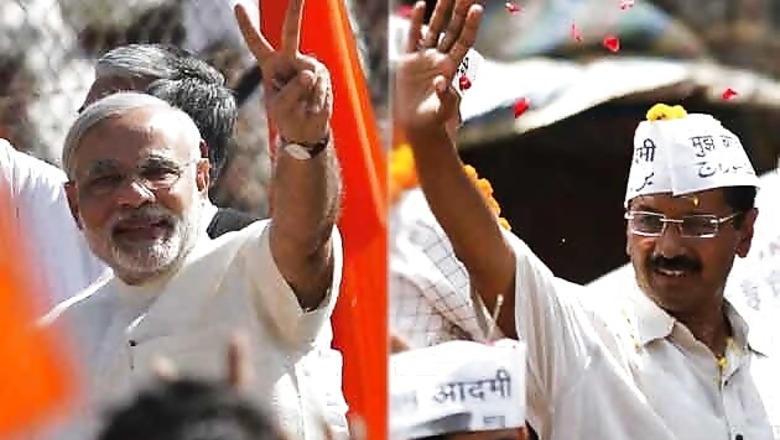
views
New Delhi: In a few weeks from now, the national capital territory of Delhi will vote for a new Assembly and hopefully get a stable government. Delhi has been under President's Rule since February 2014 when the then chief minister Arvind Kejriwal resigned after 49 days in power.
Occupying a unique status in Indian political systems, Delhi is neither a full fledged state nor a union territory and its chief minister is one of the weakest in the country.
Ever since Narendra Modi-led Bharatiya Janata Party steamrolled its rivals in Lok Sabha elections, the Indian political scene has taken a dramatic turn. Earlier most of the contests used to be Congress vs the rest, now it is BJP vs the rest. And Delhi elections are following the same pattern.
- In Assembly elections in December 2013, AAP gave BJP a run for its money and uprooted Congress which had ruled Delhi since 1998.
- The Aam Aadmi Party led by Arvind Kejriwal bagged 28 seats, BJP-Shiromani Akali Dal won 32, and Congress was pushed to a humiliating third with just eight seats.
- AAP with its elections symbol of "jhadu" (broom) promised to sweep away the dirt in politics and claimed to be the cleanest and pro-people party in the country
- After vacillating for a few days, AAP formed government with Congress support
- Continuing with his agitations, Kejriwal quit office after just 49 days in power
Importance of Delhi elections
- Pro-development schemes high on agenda in Delhi elections
- Delhi, the capital city, important as it ensures massive media coverage of even the smallest issue
Presidential style campaign: Modi vs Kejriwal
- BJP is likely to rely overwhelmingly on the Modi charisma while AAP has projected Kejriwal as its CM candidate once again.
- No CM candidate for BJP as its tallest leader in Delhi Harsh Vardhan has been elevated as a Union Minister
- Non declaration of BJP's CM candidate being publicised by rivals as the party's inability to find a suitable leader in Delhi
- Modi factor has been successful in Maharashtra, Haryana, Jharkhand and to a lesser extent in Jammu and Kashmir elections
- Kejriwal quitting as Delhi CM after 49 days is an ammunition to his opponents and they have been projecting him as immature, impulsive and an irresponsible leader who is yet to outgrow the politics of agitation and protests.
- Kejriwal's decision to take on Modi in Varanasi during Lok Sabha elections backfired massively as the latter trounced him easily.
- Like Kejriwal, AAP's other candidates also suffered big defeats across India except Punjab. The party lost all seven seats in Delhi even though it managed to increase its vote share in comparison to the December 2013 Assembly elections.
- A dispirited and virtually leaderless Congress is unlikely to mount any serious challenge and will most probably be once again a minor player as BJP and AAP fight it out.
AAP's Journey
- Kejriwal was a trusted lieutenant of anti-corruption crusader Anna Hazare.
- Kejriwal devised the protest strategy when Hazare launched his campaign to root out corruption in 2011 engaging lakhs of people including youngsters
- Kejriwal and his camp's political mission which culminated in AAP's formation on October 2, 2012.
- Several prominent people like former IPS officer Kiran Bedi and former Karnataka Lokayukta Santosh Hegde and Hazare himslef, disagreed with Kejriwal's decision and stayed away
- But Kejriwal with his close followers like Prashant Bhushan, Shanti Bhushan, Manish Sisodia, Kumar Vishwas, Shazia Ilmi and Yogendra Yadav plunged into electoral politics.
- However, Lok Sabha election debacle, allegations of Kejriwal's dictatorial and his forever-in-protest-mood style led to many of his supporters quitting the AAP.
Major issues
- Corruption, law and order, women's safety, water crisis, electricity supply, status of unauthorised colonies and infrastructure to be the main issues in the elections. Inflation, too, may play a play a role in determining the winners.
- The Lokpal issue, which was AAP's main electoral plank, no longer a prominent vote catching slogan.
















Comments
0 comment